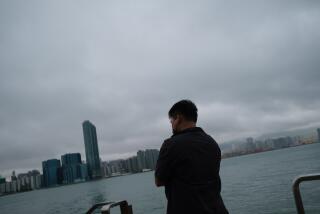TURMOIL IN CHINA: Crackdown on Dissent : In Hong Kong, British Stance Adds to Erosion of Confidence
- Share via
HONG KONG — Britain’s refusal to offer residence status to this colony’s citizens and Chinese warnings against “meddling” by Hong Kong are helping fuel an erosion of confidence that has emerged since the crackdown on government opponents in Beijing.
David Wilson, the colony’s governor, returned Friday from a trip to London, where he had been pleading with the government to be more flexible on the question of rights for Hong Kong’s British passport holders, about 3.2 million out of 5.2 million residents.
“I can’t say I am very encouraged at the moment because the initial response of the ministers and the prime minister was that what I seek was very difficult indeed,” Wilson said of his talks with the British government.
Hong Kong residents are entitled to apply for a special British passport that is a travel document but does not confer with it a right to reside in Britain. Hong Kong’s elected public officials have steadily increased pressure on London, especially since the violent suppression of pro-democracy demonstrators in Beijing, to make alternative arrangements in case China does not keep its promise to let Hong Kong continue as a capitalist enclave after it reverts to Chinese control in 1997.
Wilson said he had pressed the British government to extend a “right of entry” to those with Hong Kong’s British passports, arguing that it would not lead to the flood of people seeking to settle in Britain that the government of Prime Minister Margaret Thatcher fears. But he said that while it showed some flexibility, the Thatcher government was not prepared to go so far.
An opinion poll published Friday confirmed that public confidence in Hong Kong had begun plummeting even before the Chinese government’s use of force against the demonstrators.
The poll by Survey Research Hong Kong, which was commissioned by the South China Morning Post, an English-language newspaper, found that confidence in the future of Hong Kong has fallen to the lowest level since the survey was started four years ago, when Britain and China signed an agreement on the transfer of the colony to Chinese rule.
The survey found that of 1,000 respondents, only 52% had confidence in Hong Kong’s political future. The figure was 60% in April and 79% in January.
The opinion poll was conducted on May 26 and 27, a week after the declaration of martial law in Beijing after weeks of student demonstrations demanding more democracy. But it was conducted before the violent suppression of the students on June 3-4 which caused several hundred, perhaps thousands, of deaths.
Another cause of anxiety this week has been two attacks on Hong Kong by the official Chinese press. Supporters of China’s pro-democracy movement were accused of “meddling” in the “political turmoil” in China.
“Recently some Hong Kong people came to the mainland, encouraging, supporting and participating in illegal activities aimed at subverting the government of the People’s Republic of China and overthrowing the socialist system,” said a letter in the official People’s Daily published in Beijing.
The article singled out Lee Cheuk-yan, a leader of the Hong Kong Alliance in Support of the Pro-Democracy Movement in China, who was detained in Beijing for three days after arriving with $130,000 which he hoped to donate to the demonstrators.
Such warnings have heightened concern here because China pledged in its agreement with Britain to permit Hong Kong to retain its capitalist system and relative openness for 50 years after becoming part of China. But warnings not to interfere suggest that China would not tolerate certain activities after the 1997 turnover.
The latest opinion poll confirmed what had been apparent for weeks. Hundreds of Hong Kong residents have crammed into foreign consulates this week seeking visas to leave. Some embassies said applications had increased by 400%.
Confidence in Hong Kong’s future is measured here closely. Newspapers have reported that the price of a taxi license has dropped from $110,000 to $97,000 since the violence began in China.
Prices of stocks have gone through dizzying upheavals, with one stockbroker reportedly offering to pay customers 5 cents a share to take stock in a real estate company off his hands.
Meanwhile, there are increasing calls for the British government to grant a “right of abode” to Hong Kong citizens once the colony is returned to Chinese control.
More to Read
Sign up for Essential California
The most important California stories and recommendations in your inbox every morning.
You may occasionally receive promotional content from the Los Angeles Times.













